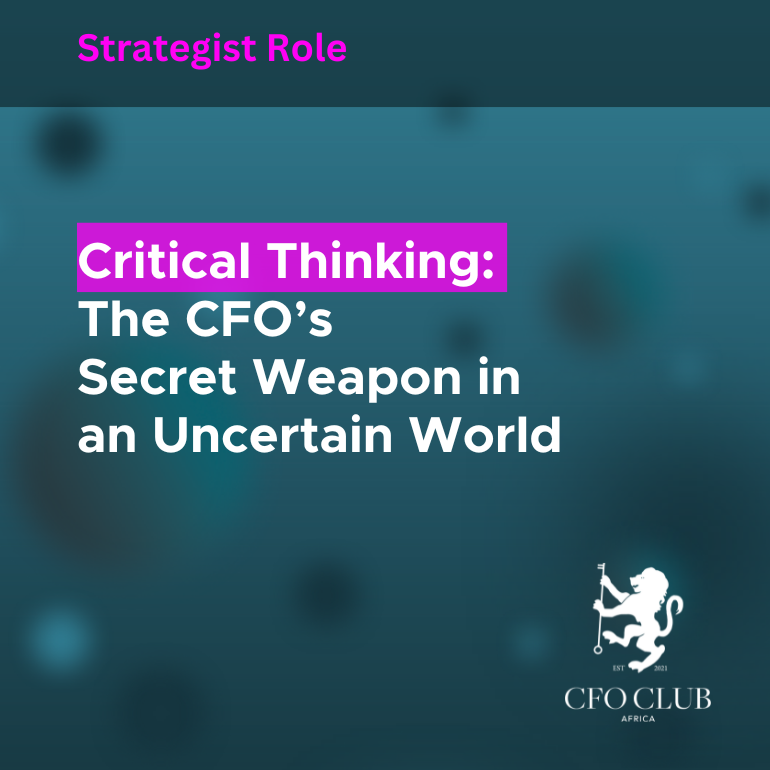Critical Thinking: The CFO’s Secret Weapon in an Uncertain World
South Africa’s economy is anything but predictable, with CFOs often finding themselves at the intersection of financial stewardship and strategic leadership. In a country where economic disparities, regulatory shifts, and global influences constantly reshape the business environment, one skill stands out as indispensable: critical thinking.
Mastering critical thinking isn’t just about solving problems—it’s about approaching them with clarity, foresight, and creativity. This article delves into the essential critical thinking skills that South African CFOs must hone to thrive in today’s corporate world.
1. Analytical Thinking: Turning Data into Actionable Insights
Numbers may tell a story, but without analysis, they’re just noise. For CFOs, analytical thinking is about diving into data, identifying patterns, and drawing conclusions that drive decisions.
For instance, in South Africa’s energy-strapped economy, analysing operational data to find efficiency improvements can significantly impact the bottom line. It’s not just about seeing the numbers—it’s about understanding their story.
Implement advanced analytics tools to visualise data and uncover hidden opportunities.
2. Contextual Decision-Making: The Power of Local Insight
South Africa’s unique socio-economic context means that a one-size-fits-all approach rarely works. Critical thinkers adapt decisions to the specific challenges and opportunities their businesses face, from navigating BEE compliance to leveraging local market dynamics.
Expanding operations into rural areas might seem risky on paper, but a CFO who understands local demand can craft a strategy that turns this into a growth opportunity.
Regularly assess external factors like community needs, regulatory changes, and economic trends when making strategic decisions.
3. Ethical Leadership: Beyond Compliance
While compliance with South Africa’s Companies Act and the King IV Code is non-negotiable, critical thinking requires CFOs to ask deeper questions: Are we acting in the best interests of all stakeholders? Is our financial strategy sustainable and ethical?
When allocating resources, a CFO might balance shareholder returns with the company’s impact on local communities, ensuring long-term value creation.
Foster an open culture where ethical considerations are part of every financial discussion.
4. Strategic Agility: Preparing for the Unknown
A CFO’s ability to think critically is tested in times of uncertainty. Whether it’s a global economic downturn or a sudden policy change, critical thinkers anticipate potential disruptions and pivot strategies to safeguard the organisation.
In South Africa, this might mean preparing for policy-driven shifts in industries like mining or energy. Strategic agility ensures you’re ready to adapt without losing sight of your long-term goals.
Develop scenario-based plans to navigate uncertainty with confidence.
5. Collaborative Problem-Solving: Engaging the Broader Team
Critical thinking isn’t a solo activity. South Africa’s diverse workforce offers a wealth of perspectives that can enrich decision-making. A CFO who collaborates with colleagues across departments gains fresh insights and innovative solutions to complex problems.
When addressing supply chain disruptions, involving procurement, operations, and legal teams can uncover solutions that a financial perspective alone might lack.
Build cross-functional teams to tackle strategic challenges collectively.
6. Effective Communication: Simplifying Complexity
Critical thinking doesn’t end with a decision—it must be communicated clearly to stakeholders. In South Africa’s multilingual and multicultural environment, CFOs need to ensure that their messages resonate with diverse audiences.
Whether explaining a financial strategy to board members or presenting risk assessments to investors, clarity and simplicity are your greatest allies.
Focus on storytelling when presenting data—explain not just the “what” but the “why” and “how.”
7. Continuous Learning: Staying Ahead of the Curve
Critical thinking isn’t static. It evolves as new challenges and opportunities arise. South African CFOs must commit to lifelong learning to stay ahead in an increasingly competitive landscape.
Action Steps:
- Attend local and international conferences.
- Stay updated on regulatory changes, such as tax reforms or ESG reporting requirements.
- Engage with peers to exchange ideas and solutions.
Conclusion
Critical thinking is an important part of effective leadership in South Africa’s volatile business environment. For CFOs, it’s not just a skill but a mindset—one that transforms challenges into opportunities and ensures the long-term success of the organisation.
By cultivating these skills, you can position yourself not only as a financial expert but as a strategic leader who drives meaningful change in South Africa’s business landscape.

